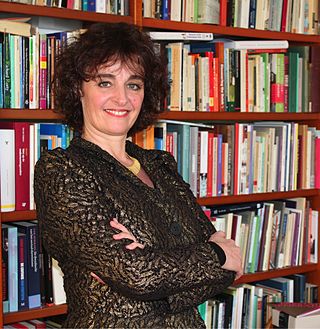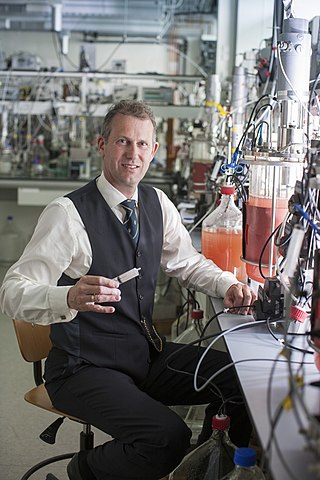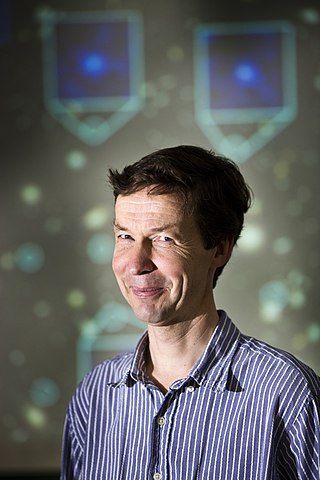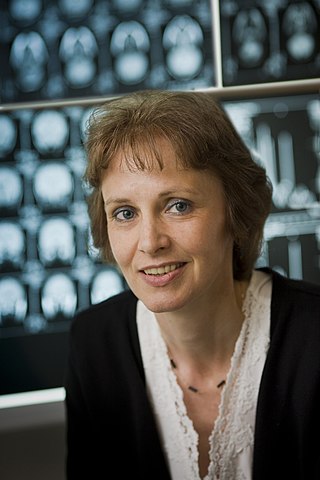
Leiden University is a public research university in Leiden, Netherlands. It was founded as a Protestant university in 1575 by William, Prince of Orange, making it the oldest institution of higher education in the Netherlands. The 29,606 scholars surveyed by Times Higher Education in 2022 ranked it between places 81 and 90 based on how good they considered the institution for research and teaching in their respective fields.

Carlo Willem Joannes Beenakker is a professor at Leiden University and leader of the university's mesoscopic physics group, established in 1992.

Frederik Herman Henri (Frits) Kortlandt is a Dutch former professor of descriptive and comparative linguistics at Leiden University in the Netherlands. He writes on Baltic and Slavic languages, the Indo-European languages in general, and Proto-Indo-European, though he has also published studies of languages in other language families. He has also studied ways to associate language families into super-groups such as controversial Indo-Uralic.

Dorret I. Boomsma is a Dutch biological psychologist specializing in genetics and twin studies.

The Spinoza Prize is an annual award of 2.5 million euro prize money, to be spent on new research given by the Dutch Research Council (NWO). The award is the highest scientific award in the Netherlands. It is named after the philosopher Baruch de Spinoza.

Willem M. de Vos is a Dutch academic and microbiologist. He studied for his PhD at the University of Groningen. He is notable for winning the Spinozapremie in 2008. De Vos is currently serving as an Academy Professor for the Academy of Finland.

Franklin Gerardus "Frank" Grosveld, FRS is a Dutch molecular biologist whose research interests are in the regulation of transcription during development with a particular emphasis on mammalian erythroid differentiation. He is a professor and former Head of the Department of Cell Biology at the Erasmus MC, Rotterdam.

Patricia Maria (Patti) Valkenburg is a Distinguished Professor of Communication at the University of Amsterdam. She is the founder and director of Center for research on Children, Adolescents, and the Media (CCAM). She is a fellow of the International Communication Association. In 2011, she received the Spinoza Prize, the highest Dutch award in science.

Alexander Godfried Gerardus Maria (Xander) Tielens is an astronomer at Leiden Observatory, Leiden University, in the Netherlands. In 2012 he received the highest distinction in Dutch science, the Spinoza Prize.

Albert van den Berg is a Dutch physicist who works on nanotechnology-miniaturization in physics, chemistry, biology and biotechnology.

Adrianus Willem "Aad" van der Vaart is a Dutch professor of Stochastics at the Delft Institute of Applied Mathematics at Delft University of Technology.

Tjitske Nienke"Cisca"Wijmenga is a Dutch professor of Human Genetics at the University of Groningen and the University Medical Center Groningen. She has been Rector Magnificus of the University since September 2019.

Corinne Lisette Hofman FBA is a Dutch professor of Caribbean Archaeology at Leiden University since 2007. She was a winner of the 2014 Spinoza Prize.

Mike Jetten is a Dutch professor of Microbiology at the Radboud University Nijmegen. He was a winner of the 2012 Spinoza Prize.

Marijn Franx is a Dutch professor of astronomy at Leiden University. He was a winner of the 2010 Spinoza Prize. His research focuses on the formation and evolution of galaxies. He is involved with both the Hubble and James Webb Space Telescopes.

Ineke Sluiter is a Dutch classicist and professor of Greek Language and Literature at Leiden University since 1998. Her research focuses on language, literature, and public discourse in classical antiquity. She was a winner of the 2010 Spinoza Prize. Sluiter has been president of the Royal Netherlands Academy of Arts and Sciences since June 2020, and previously served as vice president from 2018 to 2020.

Marten Scheffer is a Dutch ecologist, mathematical biologist and professor of Aquatic Ecology and Water Quality Management at Wageningen University and Research Centre. He was a winner of the 2009 Spinoza Prize. His research focuses on complex systems and their adaptability.

Marjo S. van der Knaap is a Dutch professor of pediatric neurology at VU University Amsterdam and the VU University Medical Center. She was a winner of the 2008 Spinoza Prize. Her research focuses on white matter disorders.

Marileen Dogterom is a Dutch biophysicist and professor at the Kavli Institute of Nanoscience at Delft University of Technology. She published in Science, Cell, and Nature and is notable for her research of the cell cytoskeleton. For this research, she was awarded the 2018 Spinoza Prize.



















